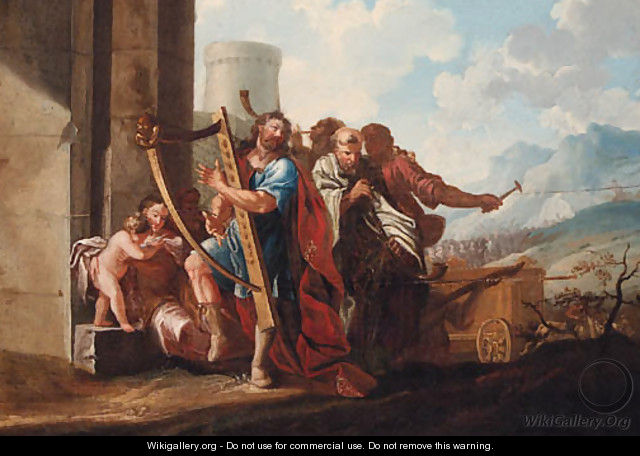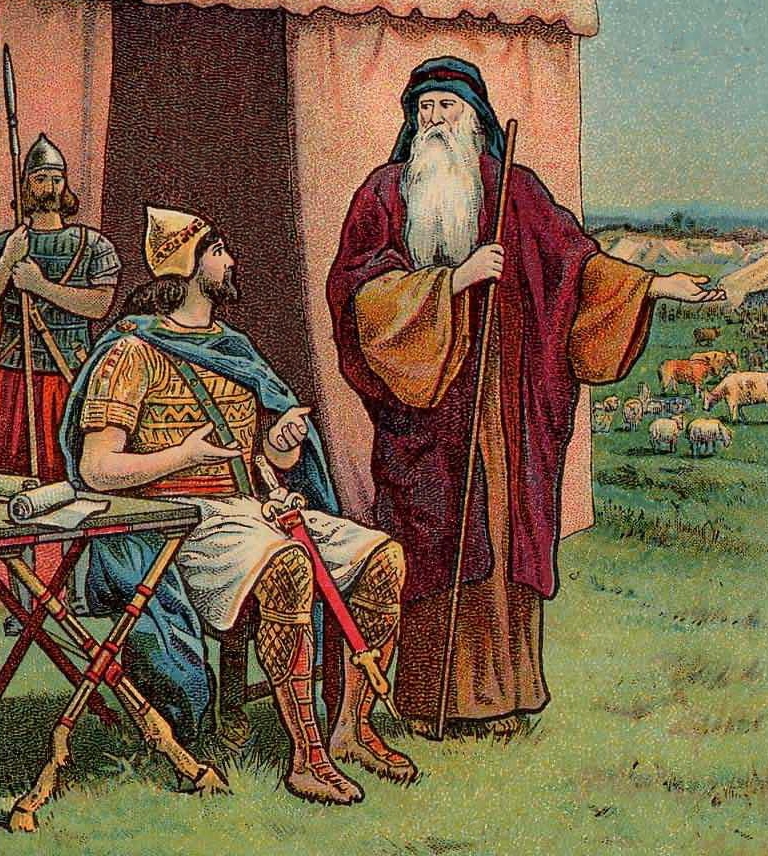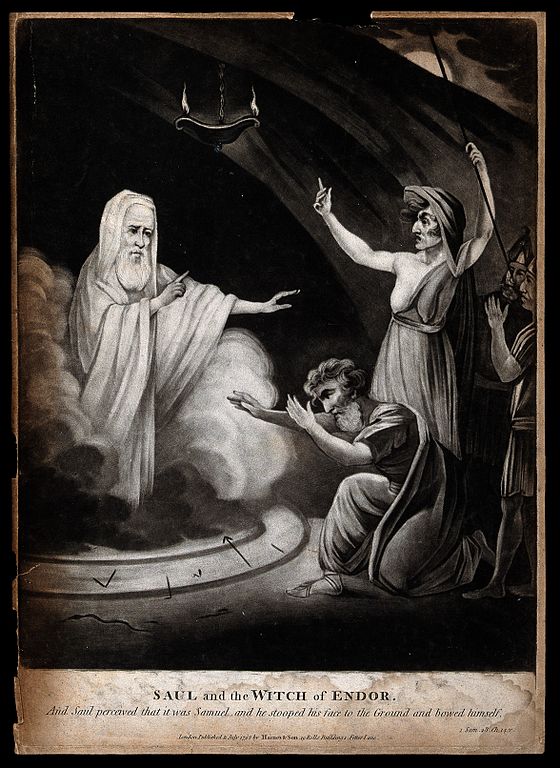Category Archives: Holiness and Righteousness
Vayikra-Tzav on True Holiness, YOU & the Sacrificial System, & Origins of Communion
Why all the recent videos? Get ready, time is short!
Mishaptim—Love Is the Fulfilling of WHAT Law?
Exodus chapters 21–23 (Parashah/Torah Portion Mishpatim) contain many laws of right conduct between people that YHVH gave to Moses and the children or Israel. These commandments teach us how to love our neighbor as ourself (i.e., Yeshua’s famous golden rule concept) and how to have peace and justice in a society. These same laws are what Paul refers to as showing love by fulfilling the law (Rom 13:8–10). Many of these same laws are those that mainstream Christianity tells its sheeple were “done away with.” So who is right? The mainstream church, or YHVH, Moses, Yeshua and Paul, that is, the Bible the Word of Elohim? This video contains the answers to these questions and much more.
U R Unhappy Cuz U R an Ungrateful Complainer
The Psalmists’ Extreme Passion for Elohim and YOU


David, the author of the majority of the psalms in the Bible, along with several other psalmists, were men who followed hard after Elohim. No less than Elohim himself called David a man after his own heart (1 Sam 13:14–16). The spiritual cup of David’s heart as well as the hearts of other psalmists were full and overflowing with passion for Elohim, which expressed itself in quantifiable, extreme and radical ways by today’s Western standards. What can we learn from such individuals, and how can we come to this same place of passionate and enthusiastic (meaning “inspired or possessed by God”) devotion to YHVH Elohim?

David did not merely express his passion for Elohim intellectually in the psalms through music and poetry, for Scripture records that in one case he actually removed his kingly robes that hindered the movement of his arms and legs, and danced leaping and whirling, almost naked, with all of his might in the streets of Jerusalem praising and worshipping YHVH to the disdaining scorn of his less than passionate wife. Needless to say, after that incident, David refused to have intimate relations with his wife ever again to the day of her death (2 Sam 6:23). This was likely because her heart was in a very different place than that of her husband, and he could never get close to her again. This incident demonstrates the seriousness with which David took his passion for YHVH and how he viewed those close to him who were of a dissimilar or antithetical passionate disposition.
To be sure, David was not the only Hebrew given to outward displays of passion. The Hebrews, in general, like many inhabitants of the Near East to this day, were a dynamic and emotionally passionate people, whose lives were a river that customarily overflowed its banks with a emotionally enthusiasm for their Creator. David was a quintessential stereotype of this cultural norm. But many of the Hebrew prophets demonstrated a similar emotional exuberance when urging the Israelites to return to YHVH and to worship and obey him only. This passion worked itself out in many seeming bizarre stunts in their attempts to capture the attention of a people who had lost their passion for Elohim. For example, on one occasion, Isaiah prophesied virtually naked through the streets of his city for three years warning Israel of its impending doom (Isa 20:3). One prophet even adorned himself with iron horns and then prophesied to the kings of Israel and Judah (1 Kgs 22:11). Once Jeremiah prophesied with a wooden yoke wrapped around his neck (Jer 22:11). Another time, YHVH instructed Ezekiel to build a model city of Jerusalem and to construct siege walls and battering rams to symbolize the fall of Jerusalem at the hands of the Babylonians (Ezek 4:1–4). After that, YHVH commanded Ezekiel to lay on his left side for 390 days and then on his right side for another 40 days to symbolize YHVH’s judgment against Israel (Ezek 4:4–6). If that was not enough, during this time, YHVH instructed Ezekiel to eat only beans, lentils, millet and spelt baked on a fire fueled by human excrement (Ezek 4:9–12). These are just several example of the extreme passion with which the biblical people of Elohim were willing to serve and obey their Creator.
Admittedly, in our day, YHVH is seldom asking his people to engage in such extreme practices as the ancient biblical prophets did in service to him. But sadly, most people are not even passionate enough to do the minimum that YHVH expects. For example, how many people are willing to put aside their electronic devices to which they are addicted along with their other secular activities long enough to pray for an hour a day as Yeshua instructed (Matt 26:40–41)?
Make no mistake, we are capable of becoming passionate about many things that are of interest to us—things that we really want to do, and we definitely make time in our busy schedules for these things. We can spend hours glued to our television and computers screens watching movies, engaged in social media on our electronc devices, listening to podcasts, watching sports events, playing video games and the like. In fact, today how many people hoot and holler acting crazy cheering their favorite sports team, but when it comes to being fanatical for YHVH, well, “that’s emotionalism” and “I’m not that kind of person,” we tell ourselves. “What will people think of me?”
There is no lack of distractions out there whose octopus-like arms laden with suction cups will grab us and suck us in to its jaws, while drawing us away from seeking YHVH. Why is this? Its is because too many of us have let our hearts become hard and cold for Elohim and as a result of this we have fallen into a state of lukewarmness, lost our first love for Yeshua along with the joy of our salvation.
So what is the aim and goal of this brief written homily? It is to hold up in front of each of us a mirror in which to see ourselves, and then to compare what we see with what pleases YHVH Elohim as recorded in Scripture, and thus hopefully to challenge each us to repent of our lassitude and incite us to “break up your fallow ground: for it is time to seek YHVH, till he come and rain righteousness upon you,” (Hos 10:12). Our as Jeremiah chides us to do, “For thus saith YHVH…Break up your fallow ground, and sow not among thorns. Circumcise yourselves to YHVH, and take away the foreskins of your heart, ye men of Judah and inhabitants of Jerusalem: lest my fury come forth like fire, and burn that none can quench it, because of the evil of your doings,” (Jer 4:3–4). Or as Yeshua warns us, “Nevertheless I have somewhat against thee, because thou hast left thy first love. Remember therefore from whence thou art fallen, and repent, and do the first works; or else I will come unto thee quickly, and will remove thy candlestick out of his place, except thou repent,” (Rev 2:4–5). These are sober and challenging warning words from our Messiah!
Do you long to see and experience spiritual revival in these days of overwhelming darkness and evil? Well, revival starts in the heart of each individual as each of makes the conscious and determinate decision to seek YHVH and to allow him to revive us. Revival starts with YOU! Selah and amein.
How intense is YOUR worship of YHVH Elohim?
Shout joyfully to YHVH, all the earth; break forth in song, rejoice, and sing praises.…Shout joyfully before YHVH, the King. (Ps 98:4, 6)
Seven times a day I praise You, because of Your righteous judgments. (Ps 119:164)
Oh come, let us sing to YHVH! Let us shout joyfully to the Rock of our salvation.… Let us shout joyfully to Him with psalms.…Oh come, let us worship and bow down; let us kneel before YHVH our Maker. (Ps 95:1–2, 6)
And her saints shall shout aloud for joy. (Ps 132:16)
Lift up your hands in the sanctuary, and bless YHVH. (Ps 134:2)
I will praise You with my whole heart; before the gods [or mighty ones] I will sing praises to You. (Ps 138:1)
Let them praise His name with the dance. (Ps 149:3)
Let the high praises of Elohim be in their mouth, and a two-edged sword in their hand… (Ps 149:6)
Praise Him with the timbrel and dance… (Ps 150:4)
How intensely passionate are YOU in seeking YHVH Elohim?
Continue readingSaul—A Portrait of a Split Personality (like you and me?)

If we were tasked with writing an epitaph on the life of King Saul what would it be, and, perhaps more importantly, what lessons would we learn from the life of Israel’s first king? Several notable aspects on his life beg to be addressed, and since the young David figures so prominently in the saga of Saul’s life, it is almost impossible not to contrast the character qualities of these two Israelites when analyzing the life of the former.

The first character quality—a notable one—when first looking at Saul’s life is that he started out as a virtual nobody from a non-notable family from Israel’s tiniest tribe and because of this he was small in his own eyes. Although he was tall and handsome, Scripture presents him as a somewhat humble and definitely a timid individual. Sadly, however, he did not remain humble once kingship came knocking on the door of his life. The prestige and power associated with regnal authority went to his head and it corrupted him as it does with most leaders of men be it the religious, political or business spheres. It is a rare individual who can remain virtuous, much less godly, when tempted with the allurements of popularity, wealth and power. Saul was no exception. How many modern politician and, sadly, most major religious leaders have fallen into this same trap? To whit, in our day, the public’s resect for both of these categories of individuals has probably never been lower than it now is.

Saul had another flaw, as well, that manifested itself early in his life. He felt the need to tap into a “crystal ball”, if you will, in an attempt to ascertain his fortune or his future. Often it was not to determine the will of Elohim for his life, but for his own selfish purposes. We first see this tendency in Saul when he endeavored to pay Samuel the prophet to divine where his lost donkeys could be found. Several times after that, Saul called on the his personal priest to use the Urim and Thummim to ascertain the will of Elohim especially when it came to doing battle. This was not a bad thing, for David did the same thing. The problem is that when YHVH failed to answer Saul in this manner, instead of asking why Elohim was no longer speaking to him and then repenting of his errant ways, he turned to witchcraft—to necromancy or spiritism—to discover his fortune. This act demonstrates a notable flaw in Saul’s character. He cared less about obeying and serving Elohim than he did about serving his own interests no matter the means necessary to do so. This is not unlike many Christians in our day who seek “personal prophecies” to know what their future holds from church “prophets” who claim to have an inside track with Elohim.
YHVH Elohim has told us in his Word what he wants us to do: obey him and keep his commandments. In other words, doing the will of Elohim must be the top priority in our lives. This was not the case with Saul and most modern Christians. Too many people are like Saul in that they serve Elohim only when it benefits them and it is convenient to do so. In other words, they conform the Word of Elohim to fit their lifestyles instead of the other way around.
Moreover, for Saul, if Elohim did not respond to him when he snapped his fingers, he looked elsewhere. Sadly, a majority of “Christians” are just like Saul. When it serves their interests, they are loyal and obedient to Elohim. However, if YHVH fails to do their bidding according to their time schedule, they turn elsewhere for aid and comfort, instead of waiting patiently in faith for heaven’s answer. Yeshua referred to this split loyalty as serving both Elohim and mammon. James referred to such a person as being double minded and unstable (Jas 1:8) and a sinner (Jas 4:8). Why is such a person a sinner? Simply because YHVH is not on the throne of such a person’s life. Following the dictates of one’s carnal, sin nature over the Word and will of Elohim is, in reality, self-worship or idolatry, which is a violation of the second commandment: “Thou shalt have no other gods before me,” (Exod 20:3). It is making oneself into the god of one’s life instead of YHVH Elohim. Many claim that Yeshua is their Lord (Master) and Savior, but is he really in charge of our lives? Face it dear reader, make no mistake, for you and I are guilty all too often of the same sin as Saul—of willful rebellion against the Word and will of our Master! Take a long, hard look in the mirror. Who is really the Master of your life? Your own mind, will and emotions, that is, the dictates of your own heart, or the Word and will of the Almighty Elohim? Do you consult the Word and Spirit of Elohim at all times for direction in your life, and then wait for YHVH to answer you? Or do you just take matters into your own hands and impetuously and wilfully blast forward regardless, as Saul did many times, instead of waiting on Elohim?

Saul’s lack of unconditional loyalty to Elohim caused him constantly to step out of will of Elohim, which, as Samuel declared, was rebellion and witchcraft (1 Sam 15:23). One does not have to don a black robe and pointed hat and fly around on a broom to be a witch! By biblical definition, we fall into witchcraft anytime we rebelliously step out of the will of Elohim, go against his Word, and do what is right in our own eyes, when it is contrary to Elohim’s Word. Eventually, Saul persisted in his rebellion and witchcraft and even found himself consulting a witch in an attempt to foretell his future.
Going against the Word, will and laws of Elohim or Torahlessness is a form of witchcraft, for it is putting our will over that of Elohim’s. Another expression of this idea is, “Do what thou wilt,” which is the modern mantra of those who have given themselves over to the religion of Satanism. Whenever, Saul stepped out of Elohim’s will, he was, in reality, resisting the Spirit of Elohim, and stepping over to the dark side—the side of the Adversary or Satan the devil. It was at this time that a evil, even murderous, spirit from Elohim began tormenting Saul. In reality, this was Elohim’s judgment against Saul. In essence, YHVH was telling Saul, “If you don’t want me to rule over you, then you’ve chosen the devil to rule over you instead. Now see where that gets you!” When YHVH pulled off of Saul the light of his grace and his Spirit, the void that was left was filled by darkness—an evil spirit. At this time, Saul could have repented and turned back to Elohim, but, instead, he persisted in his wilful, stubborn rebellion against heaven’s rule and, as a result, he lost his kingdom and his life. The devil always over-promises and under-delivers! As Proverbs declares, “There is a way which seemeth right unto a man, but the end thereof are the ways of death,” (Prov 14:12; 16:25).
Continue reading
